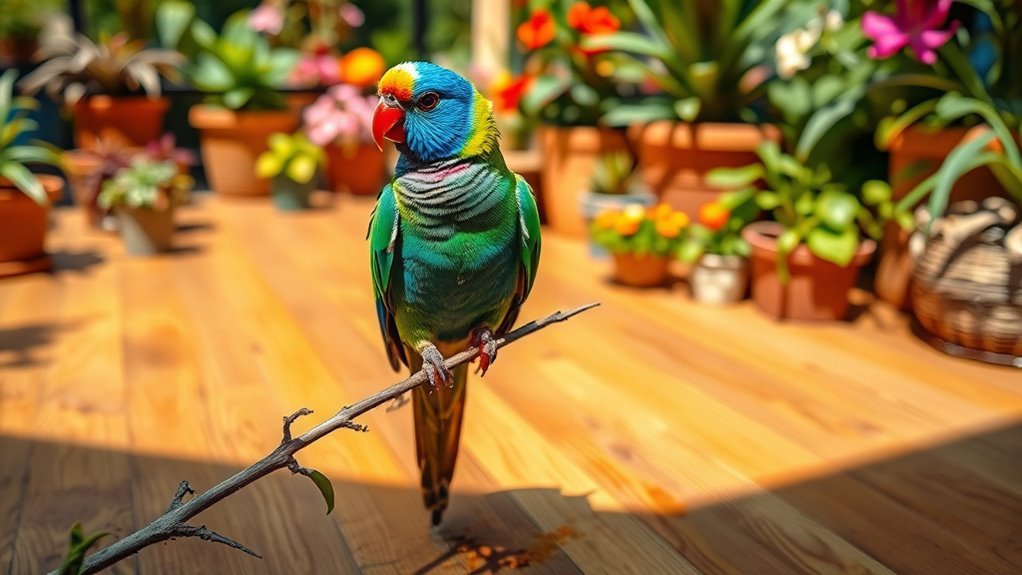Why Is My Bird Pooping Everywhere? Understanding the Signs
If your bird is pooping everywhere, consider why this is happening. Excessive droppings may indicate health problems or stress in your pet's surroundings. Pay attention to the droppings' consistency and frequency, and note any changes in your bird's behavior. Observing these signs is important, as early detection can improve your bird's health. What might be causing these changes?
Key Takeaways
- Excessive droppings may indicate gastrointestinal disorders, infections, or stress affecting your bird's digestion.
- Dietary imbalances or changes can lead to abnormal droppings, affecting consistency and frequency.
- Environmental changes or new stressors may trigger modifications in droppings' color and texture.
- Monitoring your bird's behavior and appetite is crucial for identifying potential health concerns.
- Consult a veterinarian if you notice persistent changes in your bird's droppings or unusual behaviors.
Understanding Bird Digestion and Elimination

When you see birds in your backyard or at the park, you may not think about how they digest food and eliminate waste.
Birds have a special digestive system that works efficiently. They've a crop to store food, a stomach with two sections, and a small intestine where they absorb nutrients.
The digestive process starts when birds eat. The food then moves through these organs. Waste forms and gets compacted in the intestines. This waste is what you see in their droppings.
Birds can take in important nutrients while reducing waste.
Common Health Issues Linked to Excessive Droppings
Excessive droppings in birds can indicate health problems. If you see your bird producing more waste than usual, it may point to underlying issues.
Common problems include gastrointestinal disorders, infections, or stress, which can affect digestion and cause abnormal droppings.
For example, bacterial infections can lead to watery feces, and parasites may cause more frequent droppings.
Watch for other signs like tiredness, changes in eating habits, or odd behavior.
If you're worried about your bird's excessive droppings, consult a veterinarian. Early action can help keep your bird healthy and happy in your home.
Dietary Factors That Impact Your Bird's Droppings

Diet significantly affects your bird's droppings. The right food choices influence digestion and overall health. A balanced diet includes high-quality pellets, which provide essential nutrients.
Add a variety of fruits and vegetables for additional vitamins. Fiber is important for digestion. Choose seed types carefully, as the right seeds contribute to digestive health.
Make sure your bird drinks enough water, as hydration affects the consistency of droppings. Treats can be fun but offer them in moderation to prevent digestive issues.
A well-rounded diet promotes your bird's health and keeps living spaces cleaner. This creates a happier environment for both you and your bird.
Stress and Behavioral Changes in Birds
Birds can feel stress, which may lead to changes in their behavior. Common stress triggers for birds include loud noises, sudden movements, and changes in their daily routine.
These stressors can cause harmful behaviors like excessive vocalization, feather plucking, or aggression. Recognizing these signs is important for creating a safe environment for your bird.
To help reduce your bird's stress, provide a calm atmosphere, maintain consistent routines, and offer mental stimulation. By paying attention to your bird's feelings, you can create a space where they feel secure and loved, supporting their overall health and reducing any unwanted pooping issues.
Changes in Environment and Their Effects on Droppings

Changes in a bird's environment can significantly impact its droppings. These droppings are important indicators of the bird's health. New stressors like loud noises, new pets, or moving to a different location can cause changes in droppings.
For example, if the droppings become watery or change color, this may indicate the bird is uncomfortable or anxious.
It is essential to monitor your bird closely during these transitions. A consistent and safe environment is vital for their well-being.
Proper Cage Hygiene and Maintenance
Maintaining proper cage hygiene is vital for your bird's health and happiness. Regular cleaning helps prevent disease and creates a comfortable space.
Start by removing old food, droppings, and leftover substrate every week. Use an appropriate substrate, such as paper-based liners or aspen shavings, which absorb moisture and reduce odors. Avoid cedar or pine, as they can harm your bird.
Clean cage surfaces with bird-safe cleaners to eliminate bacteria. Ensure good ventilation by placing the cage in a well-circulated area.
These practices not only promote your bird's well-being but also strengthen your bond. A clean cage reflects your commitment and love, making your pet feel secure and valued.
Signs of Illness to Look For
Even if your bird appears healthy, watch for signs of illness that may indicate hidden problems. Identifying symptoms early is crucial for disease prevention.
Here are four key signs to monitor:
- Changed Droppings: Look for unusual colors, consistency, or frequency in your bird's droppings.
- Behavior Changes: Notice if your bird is quieter, more lethargic, or shows aggression.
- Feather Condition: Check for ruffled feathers or excessive molting, which may signal distress.
- Appetite Changes: Be aware if your bird eats less or loses interest in food.
Recognizing these signs can help keep your bird healthy and happy. Your attentiveness makes a significant difference.
Consulting With a Veterinarian
Consulting a veterinarian is crucial for your bird's health, especially if you see signs of illness. A vet can assess your bird to identify issues and suggest treatments.
Regular health check-ups can catch problems before they worsen. Your bird's health relies on early care, so contact a vet if you notice any changes in behavior or droppings.
When visiting the vet, provide a clear history of your bird's diet and environment. This information helps the vet understand your pet's health better.
Tips for Managing and Cleaning Up Droppings
To keep your bird healthy, maintain a regular clean-up routine for droppings. Effective management of droppings is key to a clean and safe environment.
Here are some simple cleaning methods:
- Use a poop scoop or paper towel to quickly pick up droppings.
- Choose bird-safe cleaning products to disinfect surfaces.
- Place washable mats or towels under your bird's perch to catch droppings.
- Set regular cleaning times to prevent build-up.
Encouraging Healthy Habits for Your Bird
Creating healthy habits for your bird is important for its well-being. Use positive reinforcement to encourage good behavior. Give your bird treats or affection when it uses its bathroom area. This helps establish a healthy routine and builds a stronger bond with your pet.
Set a consistent schedule for feeding, playtime, and sleep. Routine makes your bird feel secure and can reduce stress. Less stress can help with any pooping issues.
Be patient. These habits take time and dedication to develop.
Frequently Asked Questions
Can Birds Control When They Poop?
Birds cannot completely control when they poop; it mostly happens automatically. However, they can change how often they poop based on their habits. Knowing this can help you better manage their behavior and create a more pleasant environment for them.
How Often Do Birds Typically Poop?
Birds typically poop every 15 to 30 minutes. This quick frequency is due to their fast digestion process. Factors like diet, health, and stress can change how often they poop. It's important to watch these changes for your bird's health. Regular monitoring aids in keeping your bird happy and healthy.
What Colors Should My Bird's Droppings Be?
Your bird's healthy droppings should be green, brown, or grey. If you see colors like bright red or yellow, consult a vet. These colors can signal health problems that need attention. Keep an eye on your bird's droppings to ensure its well-being.
Are There Specific Signs of Stress in Birds?
When your bird shows signs of stress, such as changes in vocal sounds or aggression, pay close attention. Changes in behavior, like hiding or over-preening, often indicate emotional distress. It's important to recognize these signs and respond appropriately to support your bird's well-being.
How Can I Train My Bird to Poop Outside?
To train your bird to poop outside, follow these simple steps:
- Use Positive Reinforcement: Reward your bird with treats or praise when it goes outside to poop. This encourages the behavior you want.
- Create Outdoor Cues: Set up a specific perch or spot outside where you want your bird to go. Always use this location to signal that it's time to poop.
- Be Consistent: Take your bird outside at regular intervals. Consistency helps reinforce the habit.
- Practice Patience: Training takes time. Be patient and give your bird the chance to learn at its own pace.
With these straightforward methods, you can effectively teach your bird to poop outside.

Hello, I’m Emily Price, the founder of Birds Affection. As a passionate bird enthusiast and spiritual seeker, I’ve always been fascinated by the symbolic meanings and mystical connections between birds and our lives. On this website, I share my knowledge and insights on the spiritual significance of various bird species, exploring their roles as messengers, guides, and teachers. Through my writing, I aim to inspire and educate others on the profound wisdom and beauty that birds bring to our world. Join me on this journey as we delve into the enchanting realm of bird symbolism and discover the hidden meanings behind these magnificent creatures.







